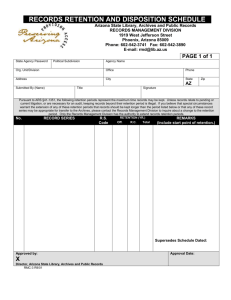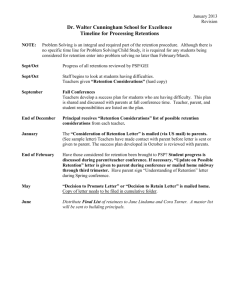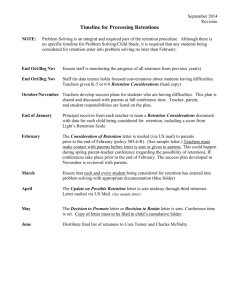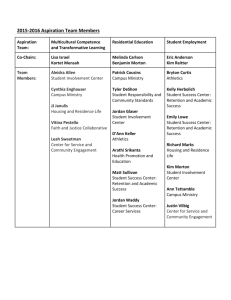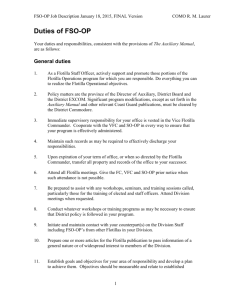UNITED STATES COAST GUARD AUXILIARY
advertisement
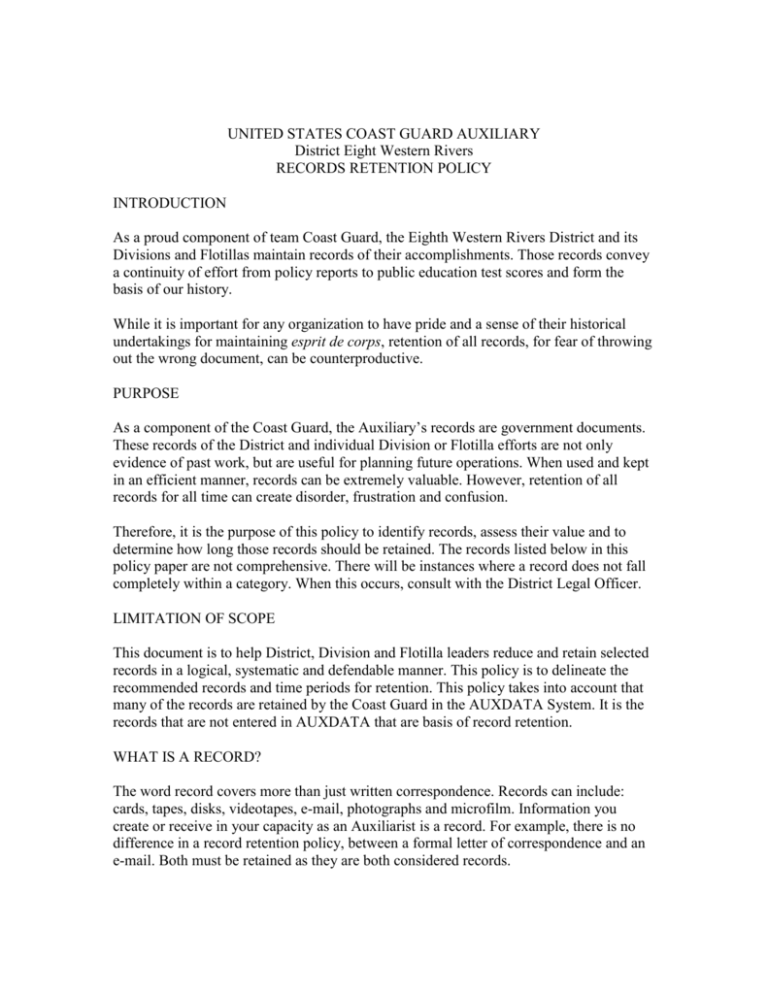
UNITED STATES COAST GUARD AUXILIARY District Eight Western Rivers RECORDS RETENTION POLICY INTRODUCTION As a proud component of team Coast Guard, the Eighth Western Rivers District and its Divisions and Flotillas maintain records of their accomplishments. Those records convey a continuity of effort from policy reports to public education test scores and form the basis of our history. While it is important for any organization to have pride and a sense of their historical undertakings for maintaining esprit de corps, retention of all records, for fear of throwing out the wrong document, can be counterproductive. PURPOSE As a component of the Coast Guard, the Auxiliary’s records are government documents. These records of the District and individual Division or Flotilla efforts are not only evidence of past work, but are useful for planning future operations. When used and kept in an efficient manner, records can be extremely valuable. However, retention of all records for all time can create disorder, frustration and confusion. Therefore, it is the purpose of this policy to identify records, assess their value and to determine how long those records should be retained. The records listed below in this policy paper are not comprehensive. There will be instances where a record does not fall completely within a category. When this occurs, consult with the District Legal Officer. LIMITATION OF SCOPE This document is to help District, Division and Flotilla leaders reduce and retain selected records in a logical, systematic and defendable manner. This policy is to delineate the recommended records and time periods for retention. This policy takes into account that many of the records are retained by the Coast Guard in the AUXDATA System. It is the records that are not entered in AUXDATA that are basis of record retention. WHAT IS A RECORD? The word record covers more than just written correspondence. Records can include: cards, tapes, disks, videotapes, e-mail, photographs and microfilm. Information you create or receive in your capacity as an Auxiliarist is a record. For example, there is no difference in a record retention policy, between a formal letter of correspondence and an e-mail. Both must be retained as they are both considered records. WHAT RECORDS AN INDIVIDUAL AUXILIARIST SHOULD RETAIN Individuals may wish to keep copies of their time activity reports in order to verify that AUXDATA information has been entered correctly. Those individual reports are also a record of activity for individual tax return information. Once verified as correct in AUXDATA, an individual’s time activity records need not be retained by the Division or Flotilla. Personal information from membership application through your most recent time working with the Auxiliary is kept by the Director of the Auxiliary and there is no need for the District, Division or Flotilla to retain copies beyond the time enumerated in this policy. TIME PERIODS FOR RETENTION OF RECORDS Records have value for different purposes, such as administrative value, fiscal or budgetary value, legal value and/or historical value. While each of these reasons may have a different time frame for the records usefulness, this policy provides uniform time frames for most records. Unless suggested otherwise in this policy, the time frames of three years or five years will apply to all records not a part of AUXDATA. The five year retention time is for policy matters at the District level, potential legal issues and all contracts entered into at the District, Division or Flotilla level. Time activity reports of individual members should be retained for one year in order to verify correct entry in the AUXDATA system. This policy only applies to records of the District, Division or Flotilla and does not supersede other recordkeeping requirements. For example, a vessel or aircraft owner who has a facility must retain their logbook permanently. ELECTED OFFICERS: RECORDS FOR RETENTION Five Year Retention: All contracts entered into by the elected officer; all matters of discipline, injury, accident or misconduct involving an Auxiliarist under your direct command. Three Year Retention: All records that do not involve any of the above categories. Any records that are in question as to which retention period to follow may be kept for the longer period or referred to the District Legal Officer for determination. An increasingly important area of record retention is computer documents and electronic mail. While Auxiliary District, Division and Flotilla officers do not have mainframes that hold all e-mails and documents, it is important that leaders maintain a record of documents as well as e-mail communications. In some systems, these documents can be transferred to a C/D or other storage methods to prevent e-mail accounts from overflowing. The amount of e-mail traffic should determine the frequency of downloading to a storage unit. Common sense must prevail in the saving of e-mails. While it is important to save the essence of the Auxiliary’s duties, many e-mails are extraneous and not important. For example, banter between Auxiliarists regarding an upcoming Public Education assignment would not have to be saved. The records should be part of any Change of Watch, with the outgoing elected officer transferring records to their successor. COMMODRE’S STAFF AND DISTRICT CHIEFS OF RESPONSE, PREVENTION AND LOGISTICS The Commodore’s staff and District chiefs’ records are different in subject and scope from most other records. Policy matters and analysis as well as tactical decisions emanate from the Commodore’s staff and the District Chiefs of Response, Prevention and Logistics. Because of the different nature of these records a longer retention policy is warranted. Matters concerning policy, analysis and contracts and any underlying correspondence, e-mails and other germane records shall be retained for a period of five years. Records that are not the subject of policy decisions, analysis of readiness, operations or contracts shall be retained for a period of three years. Any records that are in question as to which retention period to follow may be kept for the longer period or referred to the District Legal Officer for determination. DISTRICT, DIVISION AND FLOTILLA STAFF OFFICERS RECORDS FOR RETENTION District, Division and Flotilla staff officers shall transfer to their replacement the relevant records for the position. For records other than the current year, all staff officer records should be transferred to the Secretary/Records Staff (Secretary) officer. The Secretary will have the responsibility to retain the non-current records for the appropriate time period. The Secretary shall ensure that each staff officer submits each year’s records. Records held by the Secretary that are older than the three year or five year retention period shall be destroyed by the Secretary in such a manner that the information is unavailable. In all instances of records retention, every effort should be made to lessen the storage burden of those records. Transferring records to electronic storage is more preferable than paper storage. The staff officer responsibilities for record retention are more voluminous at the Flotilla level since the Flotilla is the basic operating unit. However, District and Division staff officers also have the responsibility to retain their respective records . The following District, Division and Flotilla staff officer positions may have records subject to retention for three years: Aids to Navigation Officer Any report of a discrepancy in aids to navigation; any required report. Aviation Officer Any records required to be kept as part of maintaining and flying aircraft. Communications Officer The current “calling tree” or roster of names, addresses, telephone numbers and e-mail addresses for emergency alerting of member Auxiliarists. Communication Services Officer Finance Officer Annual budgets, annual Financial Reports, receipts, disbursements or any other financial transactions. Financial transactions include contracts (five years), purchases, expenditures, solicitations, gifts and donations. It is not necessary to keep copies of checks, as they are kept by the financial institution. Information Services Officer Time activity reports from individual members (for one year only) in order to verify AUXDATA entries. Materials Officer Orders of material, publications, forms and stationary and personal property inventory of the operating unit. Marine Dealer Visitor Record of dealer visits, decals and promotional material provided. All necessary forms required for dealer visits. Marine Safety Officer Member Training Officer Inventory and location of equipment and material specifically acquired for the purpose of member training. Operations Officer The schedule of all flotilla operations, facility fuel expenditures and the frequency of individual patrols. Personnel Services Officer Biographical file and advanced training completed by members; the listing and action taken on all potential new members. Public Affairs Officer All press releases, news stories or published photographs of the respective District, Division or Flotilla Auxiliary activities. Publications Staff Officer Copies of all unit publications and articles submitted to other publications. Public Education Officer Copies of all scheduled public education, copies of receipts for all monies received from public education, student test answer sheets, inventory and custody list of all unit owned property used for public education. Qualification Examiner Secretary/Records Staff Officer Minutes of meetings. All staff officer records other than the current year’s reports. State Liaison Officer Vessel Examination Staff Officer Schedule of vessel examination dates and locations; record of courtesy vessel examinations performed; record of facility inspections performed.

